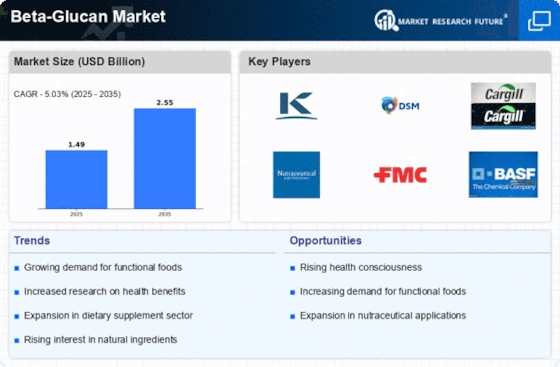Top Industry Leaders in the Beta Glucan Market

The Beta-Glucan market is witnessing substantial growth, driven by the increasing awareness about its health benefits and rising demand for functional food and dietary supplements. The market's competitive landscape reflects a mix of established players, emerging companies, and evolving strategies aimed at consolidating market share and expanding product offerings.
Strategies Adopted:
Strategies Adopted: To maintain and enhance their market positions, key players have been focusing on various strategies. This includes investments in research and development to innovate and develop new Beta-Glucan products catering to diverse consumer needs. Additionally, strategic collaborations with research institutions and universities have enabled these companies to leverage cutting-edge technology and scientific advancements to enhance product efficacy.
Market Share:
Factors for Market Share Analysis: Market share analysis in the Beta-Glucan industry is influenced by several factors. Quality and purity of Beta-Glucan products, pricing strategies, distribution networks, regulatory compliance, and marketing initiatives significantly impact companies' market share. Moreover, the ability to adapt to changing consumer preferences and technological advancements plays a pivotal role in determining market dominance.
New and Emerging Companies: The market landscape has also seen the emergence of new and niche companies capitalizing on the growing demand for Beta-Glucan. Start-ups and smaller players are focusing on specialized products, targeting specific consumer segments, and leveraging innovative extraction and production techniques to differentiate themselves in the market.
Industry News
Industry News and Current Trends: Industry news reflects a growing interest in Beta-Glucan due to its perceived health benefits, such as immune system enhancement and cholesterol reduction. Market trends highlight an increased consumer inclination towards natural and plant-based products, boosting the demand for Beta-Glucan derived from sources like oats, barley, and mushrooms.
Current Company Investment Trends: Investment trends in the Beta-Glucan market showcase a significant focus on scaling up production capacities, expanding research capabilities, and geographical expansion. Companies are investing in state-of-the-art manufacturing facilities to ensure product quality and meet the rising demand. Furthermore, strategic investments in marketing and branding initiatives are aimed at creating consumer awareness and brand loyalty.
Overall Competitive Scenario: The Beta-Glucan market is highly competitive, characterized by continuous innovation, strategic alliances, and aggressive marketing efforts by key players. The market's growth potential and increasing consumer interest have attracted both established companies and new entrants, intensifying competition. However, opportunities exist for companies to differentiate themselves by offering unique products, leveraging advanced technology, and adapting to evolving consumer preferences to gain a competitive edge.
In conclusion, the Beta-Glucan market's competitive landscape is dynamic, with key players employing diverse strategies to maintain and improve their market positions. The industry's growth trajectory is influenced by innovation, product quality, regulatory compliance, and consumer awareness, offering opportunities for both established firms and emerging companies to thrive in this expanding market.
Recent News:
Beta-glucans, sourced naturally, enjoy high demand across culinary, cosmetic, and medicinal sectors owing to their remarkable versatility and wide-ranging applications.
Key Companies in the Beta-Glucan market include
- Kerry Group plc.
- Givaudan SA
- Koninklijke DSM N.V.
- Euglena Co. Ltd
- Biotec Pharmacon ASA
- Tate & Lyle plc.
- Lesaffre Group
- Kemin Industries, Inc.
- ABF Ingredients
- Super Beta Glucan
- Garuda International, Inc.











